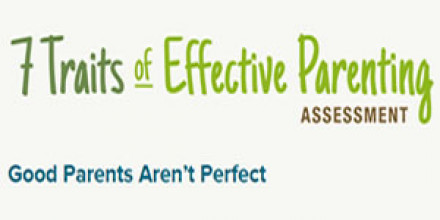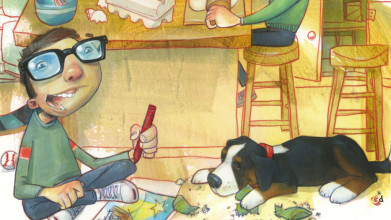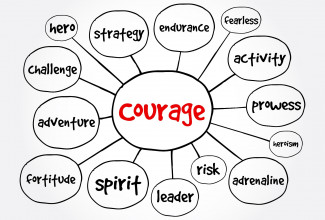Preview:
Courtney DeFeo: It’s pretty to write those down and say, “I want them to be generous kids. I want them to be kind kids.” And, but most of these were all biblically based virtues. But then it’s tough to say, “Okay. Now, how?” You know, they don’t just wake up and come out patient kids. So that really struck me as how, in the midst of feeding my kids, getting them to school, putting them to bed, how do these virtues come to life? How do you bring faith to life in a way that’s not a lecture?
End of Preview
John Fuller: Unfortunately, I can tend to do more of that lecture thing with my kids. Just feels so good sometimes. Uh, how about you? Uh, this is Focus on the Family. That’s Courtney DeFeo, and she’s back with us again. Uh, last time, she shared that she’s definitely, uh, a been there, done that kind of mom, but she’s not afraid to reveal her mistakes as a parent. And I think you’ll benefit greatly from this conversation. Your host is Focus president and author Jim Daly, and I’m John Fuller.
Jim Daly: John, last time, we featured a great conversation with Courtney about important character traits that we need to pass on to our children, uh, things like gratitude, joy, and generosity. I remember how teaching my boys to say please and thank you seemed like it would (laughs)-
John: (laughs).
Jim: … never end.
John: Th-, those were the big-
Jim: (laughs).
John: Those were the big battles back then.
Jim: I mean, thousands of reminders, remember?
John: (laughs).
Jim: Please and thank you, right? And then at some point, you see them kind of at a distance in a public setting, and they use it. And you’re going, “I didn’t even know they were listening-
John: Yeah.
Jim: “… all those years.” (laughs). Today, we’re going to focus on a few more of those simple lessons that Courtney outlines in her great book In This House, We Will Giggle: Making Virtues, Love, and Laughter a Daily Part of Your Life. And that’s a great title.
John: It is. And it’s just one of the many parenting resources that we have for our listeners here at Focus on the Family. Uh, for example, we have a free parenting assessment, which helps you examine seven essential traits that can help you be more effective in raising your children. And you can learn more about the assessment and Courtney’s book at focusonthefamily.com/broadcast or when you call 800, the letter A, and the word FAMILY. And as we explained last time, Jim, I was out of the office, uh, when you recorded with Courtney. So our colleague Kim Trobee joined you in the studio. And now, here’s more of that conversation with Courtney DeFeo on Focus on the Family.
Jim: Let’s recap. Last time, we did talk a bit about joy, and you, uh, talked about in your book the joy field journal. And we didn’t get to that. And if you missed the discussion last time, download, get the CD, whatever you need to do. Contact us here at the ministry, and we’ll make sure you get that. But talk about the joy field journal.
Courtney: Yeah. I think it was an exercise that, uh, my girls and I were talking. And sometimes, w-, even with boys, you can only sar-, so far with the discussion.
Kim: (laughs).
Jim: Yeah. (laughs).
Courtney: You know? So we were talking about the difference between joy and happiness, and then there really is a difference. You can be happy with just fleeting things. You know, a sunrise can make you happy or a friend at school can make you happy. But some of those things are fleeting. So as Christians, shouldn’t we be the happiest people walking around the earth?
Kim: Mm-hmm.
Courtney: You know, we have eternity.
Jim: Without a doubt.
Kim: Mm-hmm.
Courtney: You know, we d-, you need to probably stop freaking out is what I think, you know?
Kim: (laughs).
Courtney: We’ve got some things that are pretty secure in our world. So as we thought about an activity for families, I thought, “What if we did a field journal, just like scientists would really study people? And so let’s just start making notes as a family and start looking, “Who’s happy? You know, is the person at Publix doing our groceries, are they happy or are they joyful? And how do we know the difference?” So my girls are little. They’re six and eight. And so we started drawing people in our journal. And they wrote different things, you know, sunshine, and they wrote, um, “They look like sunshine.” And they started writing names of people that they thought were truly joyful, and they brought up my mom, which I would totally agree with. She’s got Jesus just shining out of her pores. Uh, and then they’d write about certain teachers that they thought were joyful. And I would agree with them. Um, then they wrote something pretty interesting. My little one who’s six, she put the words you, Y-O-U, in both of the hands of the stick figure. And I said, “Why did you do that, Larson?” And they said, she said, “Because she’s thinking of others.” And I thought-
Kim Trobee: Oh, that’s great.
Jim: Huh.
Courtney: … “Whoa. How profound (laughs) for a six year-old to think.”
Jim: She’s catching it.
Courtney: Yeah. A joyful person is not thinking about themself. They’re thinking of others. And so I think that exercise is just saying, “Instead of just lecturing them, how do we take an activity?” Um, and it’s almost like sneaking carrots into brownies. It’s like, “Don’t tell them-
Jim: (laughs).
Courtney: “… they’re about to get a virtue lesson.”
Kim: (laughs).
Courtney: “Shh.”
Jim: Don’t tell me you do that.
Kim: Now, wait a minute. Wait a minute.
Courtney: Yeah. No.
Kim: I want to know-
Courtney: No. I heard-
Kim: … did you make the field journal?
Courtney: You know, I have to look back. That’s so funny.
Jim: (laughs). Whoops.
Kim: (laughs).
Courtney: I hope so.
Jim: Yeah.
Courtney: Yeah. That’s also, yeah-
Jim: It’s a good, it’s a good gut check. Um-
Courtney: I think they put themselves-
Kim: Well, yeah.
Courtney: … in there. Me? Yeah. Yeah.
Kim: I’m joyful.
Courtney: I’m joyful. I hope so.
Kim: Well, I know there’s going to be a mom listening today, and she just got done refereeing the greatest, you know, WWF battle between her-
Courtney: Right.
Kim: … three children.
Jim: Uh-huh.
Kim: And she’s listening to this broadcast, and they don’t want to share, they don’t have joy. What can she do right now in this moment to bring joy back into that situation?
Courtney: Yeah. And, you know, the temperaments, well, I think we’re going to get there, but everybody’s got a different vibe in their home. And I have been accused of being Pollyanna. So the person, what I would do is a little bit different than what my sister would do. And we are just different moms. And so I may break into a song or literally have a dance party. And I’m a queen of distraction (laughs), you know?
Kim: (laughs).
Courtney: Turn on the re-, most ridiculous song and start dancing to distract them out of it, um, or just change the scenery. We change the scene a lot. You know, if it’s, it’s a major situation that needs to be dealt with, I don’t… you know, if they need to be disciplined, we would sit down and they would apologize, and we would deal with it. But if it’s something that’s like, “Hey, they just need to get out of the house and go run the lap or just get out and just distract them,” we will do that, too. Um, I have shocked one of my children out of a tantrum with just saying, “I’ve got the joy, joy, joy, joy down in my heart,” and she-
Kim: (laughs).
Courtney: … ’cause I sing, um, terribly, she was shocked that I just started singing in the midst of her tantrum. But I think it was just so shocking that, “Mom, I’m having a fit here about my socks, and why are you singing?”
Jim: (laughs). So it, it’s, it really shut her down.
Courtney: Yeah. It shut her down.
Jim: (laughs).
Courtney: But I think there is not always a thing. You do need to handle the situations with correction, of course. Um, but changing the scene is one of our go-to situations for sure.
Jim: And, and you mentioned the temperament side, because I think, you know, oftentimes as couples, married couples, opposites attract-
Courtney: Mm-hmm.
Jim: … typically. I know, uh, that isn’t always the case.
Courtney: Absolutely.
Jim: Um, what if it’s not your natural bent? What are those things you can do? Do you have to schedule it? Do you have to be that disciplined to say, “Okay. From three to four, we’re going to have joy?”
Courtney: Yeah, yeah.
Jim: “And we’re going to do it this way.” What do you do if you’re not naturally given to bursting into a song when your kid’s throwing a tantrum?
Courtney: Yeah.
Jim: That’s not normal, by the way, Courtney.
Courtney: I know.
Kim: (laughs).
Courtney: I know. And I think-
Kim: I love it, but it’s not normal (laughs).
Courtney: I’m so glad you brought this up, because I think the comparison game is one of the biggest problems right now in motherhood. And social-
Jim: How does it play out?
Courtney: Sho-, social media has only worsened our situation. We’ve given us more exposure and more tools than ever before, but it’s just highlighted, eh, the best of everybody’s world. And I’ll give you an example. My sister and I are dear friends and close, but we could not be more different. She has two boys. I have two girls. I am an idea person. I crave ideas and things to do, and I’m highly creative. And she would rather have about two friends and two things to do in a day and be quiet and not do much in a day. I’ll have 90 things to do and 90 friends.
Kim: (laughs).
Courtney: And, and so what she does with my book and my ideas, as she, eh, goes through patience, or maybe she’s looking at generosity, she uses it as a resource. If she needs an idea or inspiration, she will look at it as she needs it. But she is not using it as a handbook and she will not pick it up and do a hundred ideas. She may try one. And she thinks about her boys, her plate, her giftings, and she’s just mature in her faith and is not getting rocked.
Kim: Oh, good.
Courtney: And she doesn’t stay on social media.
Kim: Yeah.
Courtney: I’m so proud of her.
Jim: Well, and that’s part of it. Maybe there’s not a one size fits all.
Courtney: Right.
Jim: You’re, you’re trying to give people tools to, um, accommodate or to customize-
Courtney: Mm-hmm.
Jim: … so that they can use them in your home. For those that didn’t hear last time, talk about the structure of the book and what a person e-, can expect. What, how do you link the observation and then the idea or the exercise to help your child better understand the attribute? Just pick one.
Courtney: Yeah. Absolutely. Let’s pick patience, for example. Um, in the first part of the chapter, you’ll hear about why patience is just an important virtue and why that’s something you might consider as a family for something that you instill for your children and why that could be a focus for even just pick one month out of the year that your family might focus on that. And then the second half of the chapter just gets really practical, how you could teach that in your home that month. So we provide a definition, a f-, a kid-friendly definition, which would be waiting with a happy heart. And then there’s a verse to go with that so your kids can memorize that or you can keep referencing a verse to go with that.
Jim: And again, you concentrate on that for an entire month.
Courtney: Yeah. Yeah. So you’re not rushed, ’cause I think even as parents, and I go back to when they were little, we want to teach them to, “Don’t throw food off the highchair,” and-
Jim: (laughs).
Courtney: … “Say please and thank you,” and, “Don’t forget to put your laundry in the thing.” We teach them 50 things at once when they need to learn one or two things at a time. So if we can really focus and not overwhelm ourselves as parents, um, and just focus on one thing and then-
Jim: The hard part about that, and I get that, is-
Courtney: Mm-hmm.
Jim: … y-, y-, do you just let those other things go then until another time comes around?
Courtney: No. I think we just don’t make them all a major deal.
Jim: (laughs).
Courtney: It’s like pick your battles, you know? If we’re harping, everything’s major-
Jim: Ouch.
Courtney: … and they’re feeling just beat down, you know?
Jim: Yeah.
Courtney: Think about us. If our parents were constantly emailing us saying, “Hey, I heard you on Focus on the Family today, and you talked too fast and you missed that beat, and I wish you wouldn’t have said that.”
Kim: (laughs).
Courtney: … you know, I would be like, “Dad, did I do anything right?”
Jim: Yeah.
Courtney: “Did I say something encouraging?” You know? So I think as parents, we just have to think about even us and our insecurities. Like, is there something we’re doing well? Is there something we could just say, “Hey, these are going to fall in the encouragement category. We’re going to keep affirming them in these sides, and then we’re going to, we’re… these are the two or three main deals.” So-
Jim: You know, Courtney, it strikes me, what you’re talking about, is the utter attitude of the Lord toward us.
Courtney: Oh, yeah.
Jim: I mean, the difference between the Pharisee t-, saying all those things.
Courtney: Mm-hmm.
Jim: You know, the legalistic religious people saying, “Hey, you’re not doing that right. You’re not doing this right,” and the Lord saying, “Just come and love me…”
Courtney: Yes.
Jim: “… as I love you.”
Kim: Mm-hmm.
Courtney: Yeah. And I think about our homes, and you think about your own homes. Was it a house of fear, or was it a house of joy and love? And it wasn’t perfect. My house wasn’t perfect. But I remember what my mom did and how she lived out Christ for me and that, all the lectures. I remember her being generous. I remember how she invited people into our home. I remember how she handled my mistakes. And same with my dad. And so as I think about even the home that we all run back to my parents’ house now for vacations, ’cause we just feel like we belong there. And so as I think about my girls, I know they might be, they might do their own thing in college, too, like I did, embarrass me like I embarrassed my parents. But, um, it’s okay, you know? It’s, they’re going to make mistakes. And so I don’t want them striving to be good Christian kids that make that author mom proud and do everything just perfect.
Jim: (laughs).
Courtney: You know, I want them, at the end of the day, having a real relationship with God.
Kim: Mm-hmm.
Courtney: And I want them having joy, and I want them, um, just feeling like they belong in our walls and they can walk in no matter what they’re dealing with.
Jim: Mm-hmm.
Kim: Yeah.
Jim: And it’s really well said. E-, let’s finish the patience side of this, though.
Courtney: Sure.
Jim: You brought it up. Let’s talk about it. Every mom and dad wants their son or daughter to be patient. And usually (laughs), we lose our patience-
Kim: (laughs).
Jim: … in teaching them how to be patient.
Kim: Yeah.
Jim: Talk about that activity level that you get to in the book and, and what would be some examples of how to-
Courtney: Well, I, um-
Jim: … how to do patience particularly?
Courtney: I come to you as an expert.
Jim: Yeah. (laughs).
Courtney: ‘Cause I am one of the most impatient (laughs) people in the planet.
Kim: (laughs).
Jim: I love it.
Courtney: Yes. Thank you. Um, so one of the things that we do is a simple one, but, uh, we time our littlest one with our iPhones and just say, “How long literally can you sit here and not talk?” So just the old timer is like, “Can you, um-
Jim: And how well does that work?
Courtney: She started with, like, 12 seconds.
Jim: (laughs).
Courtney: And she’s worked up to, like, two minutes.
Jim: That’s pretty good.
Courtney: We’re like, “Don’t-
Kim: You really have to do that sometimes.
Courtney: Yeah.
Jim: Yeah.
Kim: Because they can just literally talk all day long.
Courtney: (laughs). Totally. Yeah.
Kim: You know?
Courtney: Yeah.
Jim: We had it last. Trent, for some reason, wanted to bug Troy. So during a game Troy was watching on television, Trent just started yapping and he wouldn’t stop. It was getting so irritating. And I was saying, “Trent, stop it.” And he goes, “Well, I’m just having fun with him.”
Courtney: (laughs).
Jim: And Troy’s going, “Dad, get him out of the room.”
Courtney: Yeah. (laughs).
Jim: And it was just, just like-
Kim: Troy-
Jim: “What do we, what are we teaching each other here?”
Courtney: Absolutely. Yeah.
Jim: How to get frustrated.
Kim: (laughs).
Jim: One of the wonderful fruits of the Spirit, frustrating your brother.
Courtney: Yes. Absolutely. Well, for patience, the activity is, again, more geared toward little ones. But the, the application of so many of these is we are raising eventually adults. You know, I want my kids to not only be patient for a cookie. But eventually, they’re going to wait on a spouse and they’re going to wait on a job and they’re going to wait on their house to sell. Like, I’m (laughs) so impatient about my house.
Kim: (laughs).
Courtney: So eventually, they’re going to say, “Okay, Lord. I trust that you have something better coming, and I’m willing to wait.” And so these are just profound virtues that we’re practicing as little ones and that… So the idea and the activity is that you give them something in a brown bag that they can’t see, but you’re going to say, “If you’ll trust me, this is better for later. But right now, you could eat this candy. So which one are you going to choose, A, the candy, or are you going to wait for tomorrow and get the better reward?” And they, my kids both chose the bag. You know, they, they were pretty smart and said, “Okay, we’ll do the bag.”
Kim: (laughs).
Courtney: And the next day-
Jim: Now, you wouldn’t trick them on purpose, would you?
Kim: (laughs).
Courtney: No. No. No. So the next-
Jim: Just curious.
Kim: Yeah. What, what was in the bag?
Jim: I would (laughs).
Courtney: What was in the bag?
Kim: That would have been my question, “What’s in the bag?”
Courtney: Okay.
Kim: You know?
Courtney: Because I don’t cook, bake, or anything, it was, you know, boxed brownies.
Kim: Oh.
Courtney: Some people would do something else, you know? But we did some boxed brownies the next day, and they were so fired up, ’cause I don’t ever get in the kitchen. So they’re like, “We’re making brownies?” So they were so excited to get in the kitchen with me.
Jim: (laughs).
Courtney: And they made brownies.
Jim: And stir some water in there.
Courtney: Stir. Yeah.
Kim: (laughs).
Courtney: Stir and crack an egg. That was, like-
Jim: (laughs).
Courtney: … shocking for my family. So it’s just the idea that, again, we don’t tell them what we’re doing, “We’re about to have a family lesson patience.” Like, “Hey, come here, girls. I have a little trick for you, a little game.”
Jim: (laughs).
Courtney: And they, they loved it. And they get it. And so it’s over time, we keep practicing and talking about these virtues in a way that’s not a lecture. It’s more like laughter and more an experience.
John: Hm. Some great ideas from our guest Courtney DeFeo on today’s episode of Focus on the Family. And, uh, Courtney’s describing a book she wrote called In This House, We Will Giggle: Making Virtues, Love, and Laughter a Daily Part of Your Family Life. We’ll be happy to tell you more and, uh, offer you an audio download of the entire conversation with Courtney, including yesterday’s show, when you call 800, the letter A, and the word FAMILY, 800-232-6459, or swing by focusonthefamily.com/broadcast. And now, here’s the conclusion of Jim Daly’s conversation with Courtney DeFeo on Focus on the Family.
Jim: Uh, you talk about keeping a faith journal, which I think is great.
Courtney: Mm.
Jim: I don’t do it.
Courtney: Yeah.
Jim: I need to. I keep it in my head.
Courtney: Mm. Yeah.
Jim: Which is not (laughs) the best place to keep anything.
Courtney: No.
Jim: (laughs).
Kim: (laughs).
Jim: We’ll just leave it at that. But the, uh, the idea of writing down what God has done in your life and in people’s lives around you, uh, is that what you do?
Courtney: Yeah. This is the idea that came up for the faith chapter. My brother is a pastor in Atlanta, and he and I have great conversations. And he’s my kid brother, nine years younger, and, promise you, he’s wiser than, um, all of us combined in our family. But he was saying, “I just want my kids’ bedtime stories to become faith tales. You know, why can’t, “And they live happily ever after,” these stories of how God actually worked in the lives of our family members become so intriguing to our kids that that’s what we put them to bed with?” And so he said, “I want them to know Noah and, uh, Moses and Ruth and all the stories of the Bible.”
Jim: Hm.
Courtney: “But I also want them to know that one time, Pop had a hard time and he prayed, and here’s where God showed up.”
Kim: Hm.
Courtney: “And one time, Aunt Courtney had a dream to write a book, and she did it. And here’s where God showed up.” And so he said, “What if we start capturing those for our kids and they had a record of that?” And so I thought, “That is the idea, Drew,” because faith-
Kim: Yeah.
Courtney: … our definition is knowing, loving, and following Jesus. And so if I want that to become, um, real and so that when they doubt, ’cause it’s not if, when they doubt that Jesus is real, they can come back and say, “I have evidence not only in this book that’s 2,000 years old, but in a book about my family members.” Um, and so we’ll, we can also talk about if you’re new to faith, that could be a challenge. But you can start right there.
Jim: Oh, sure.
Kim: Absolutely. You know, you talk a lot about leaving a spiritual legacy. And someone might be listening out there today, and you just mentioned maybe they’re a new Christian or maybe they just haven’t thought about-
Courtney: Mm-hmm.
Kim: … the good things that God has done for them. Talk a little bit about what you mean by leaving a spiritual legacy for your home.
Courtney: Yeah. S-, I, my heart goes to folks that are new to faith, because I think I, I think I forget, you know, what a blessing it is to have parents and grandparents and generations of people that just knew God and have that in a part of the fabric of our family. I’ve never known anything different than God being in our lives. And so for folks that this is a new topic and this is new for your kids, it can be overwhelming to say, “How do I pass on what I don’t even know to my children?” And I think you just start, and I think you start asking God, “How do I do this?” And you can be one second ahead of your children and learn something new at church and just get them in the car and say, “Guess what I heard this morning? And I want to share it with you.” And say, “Hey, let’s pray together and let’s see what happens.” And so you are teaching your kids every day as you’re growing in your own faith.
Jim: And that is a brilliant way to do it. I think unfortunately sometimes the parents that are more structured…
Courtney: (laughs).
Jim: … uh, don’t comprehend that that can actually be achieved by the other parent who may be doing it on the go.
Courtney: Yeah. (laughs). That’s right.
Kim: (laughs).
Jim: I, now, I’m not speaking from personal experience (laughs).
Courtney: Right.
Jim: But you know, one of the things I enjoy is driving th-, uh, the boys to school, which is early now, and, uh, about 7:00 we take off. And in that drive time, which is about 20 minutes for us, there is so much you can cover.
Courtney: Mm-hmm.
Jim: “Um, you know, the other night, I saw you get angry about something. Can you tell me more about that? Why would that upset you the way it has?” But it really, it’s a reminder to do intentional parenting.
Courtney: Mm-hmm.
Jim: Don’t let this time just slip on by, thinking the kids are somehow going to grab those things you want to teach them, but you’re not asking them about it.
Courtney: Yes. Absolutely.
Jim: And, and there’s a value in that for the parent who wants the structure and the devotional time around the dinner table. Don’t be too hard on your, on your mate, on your spouse…
Courtney: Oh, yeah.
Kim: Mm-hmm.
Jim: … who is finding a different way to communicate.
Kim: Absolutely.
Jim: And the fact that both are working is actually, I think, a benefit to the child. For them to have it coming at them in both directions, something structured-
Courtney: Mm-hmm.
Jim: … something unstructured, is beautiful, especially if they’re willing to participate in both.
Courtney: Amen. I think Ron’s gift that is so beautiful is listening. And I am the one that’s constantly making a teachable moment where they’re, like, running for the hills, “Oh, here she comes.”
Jim: (laughs).
Kim: (laughs).
Courtney: “What are we going to have to do now?” It’s like, “Oh, Lord.”
Jim: Write in the diary.
Kim: She’s got a brown bag.
Courtney: “We just-
Kim: Yeah.
Courtney: Yeah. “We’re just trying to get ice cream and now there’s some sort of lesson coming out of the ice cream scoops here.”
Kim: (laughs).
Jim: (laughs).
Courtney: So I think I, you know, every parent brings their gift. And one of the best things we can do is be quiet-
Jim: Mm-hmm.
Courtney: … and just ask them about their day and listen and ask them what they think about a topic, and maybe not even insert an opinion and just listen to them. And so I think those parents that are new to faith, just start asking them questions and just start even invite, taking them to church and inviting other influences into their life, because if you don’t know all the answers, guess what? I don’t either.
Jim: (laughs).
Courtney: And I am begging people to come help me get on board, ’cause it’s going to take an army to raise, um, these two wild ones, um, in my house. So listen more. And I think it’s true of even how we serve. We will often, the Christian, our culture, we want to go in and fix and do and teach and tell people what we know, and we just need to be humble and serve and say, “How can we help you community?”
Kim: Mm-hmm.
Courtney: And we need to listen more than we lecture.
Jim: Let me ask you about, um, the idea of responsibility. That’s one of the other virtues in your book, the 12.
Courtney: Mm. (laughs).
Jim: And, you know, you start at a young age and you start with them doing some chores and (laughs)-
Courtney: Mm-hmm.
Jim: Then they get older. Now, our kids, all three of us, are at different stages. Kim, your boys are grown and gone, mine are teenagers, yours are still little ones.
Courtney: Mm-hmm.
Jim: My goodness, we’re doing responsibility training from zero to 30 (laughs).
Kim: Yes.
Courtney: Right. Right.
Kim: Yes.
Jim: Why’s it such a hard concept for these little ones, and they grow into bigger ones, to learn responsibility? What have we done wrong that they’re not getting it?
Courtney: Well, I may need to ask here, because here, I have, I’ve discovered a problem in my own.
Kim: (laughs).
Courtney: So we just moved, as you know. And I had someone come help me do some organizing and moving. And as she pulled out everything of my closet, I discovered I have a lot of systems…
Jim: (laughs).
Courtney: … that I started.
Kim: (laughs).
Courtney: And I have zilcho execution.
Jim: (laughs).
Courtney: She’s like, “What are these jars?” I’m like, “Well, that was, that was this chore thing that I started.”
Jim: (laughs).
Courtney: “And anyway, we can give that away.”
Jim: Empty jars.
Courtney: It’s like… Yeah, yeah.
Kim: (laughs).
Courtney: And then she pulled out another one. I’m like, “Well, that was that responsi-… Well, yeah, we can donate that.” And, um, so I just realized that, man, I have a problem with moving on to the next cool thing on Pinterest, and I probably created half of them, and they’re, you know, on my site of just great ideas.
Kim: (laughs).
Courtney: And the problem, I feel like, is that we, it is hard to execute. It is hard to stay on the kids and make them do work that they don’t want to do, ’cause work is work and it’s not easy. Um, but we’re doing a favor to them. Um, we’re doing a favor to their wives and their husbands, for goodness sakes, when we say, “Eh, you actually have to learn to do laundry and put your food away.”
Kim: Yeah.
Courtney: “You know, there’s things that you’re going to have to learn to do.” Um, and it builds up their esteem, actually-
Kim: Mm-hmm.
Courtney: … to feel like they’re capable of doing something in the world. So my problem, and I dum-, I’m not an expert, mine are little, is that I ha-, need to just pick something. You know, there’s not a trick system out there. There’s going to be, have to be one, just like weight loss. It’s like, “Pick one. You know, eat less and exercise, but pick it and stick with it.” One of them will work if we’re consistent. And I know for me in my house, it’s easier to b-, just do it myself. I’m like, “I’ll make their bed in two seconds, but they take all day.”
Jim: (laughs).
Courtney: I’m like, “Are we still doing the pillows?”
Jim: (laughs).
Kim: Yeah. Yeah.
Courtney: “Why are they still in there making their bed?”
Kim: Yeah.
Jim: Oh, man.
Kim: Yeah.
Courtney: So, and I think we do them a great, um, disservice if we keep doing their work for them.
Jim: Well, and Jean’s really good with that. I mean, I’m constantly throwing wrappers away-
Kim: Yeah.
Jim: … in the kitchen that are left on the counter. And she’ll say, “You’re just enabling.”
Kim: That’s right. That’s right.
Jim: It’s the, “You’re an enabler.”
Kim: (laughs).
Jim: And I’ll say, “No, I’m a getter doner.”
Courtney: I heard the term-
Kim: (laughs).
Courtney: I heard the term lawnmower parent the other day. Have you heard this?
Kim: No.
Jim: No. What’s this?
Courtney: Okay. Well, it was the helicopter parent for a while. And now, they said the lawnmower parent is the one that just keeps smoothing things out for their kids.
Kim: Ooh.
Jim: Oh, it’s the… Yeah.
Courtney: And I thought, “That’s, I’m a lawnmower parent, I think.”
Kim: Yeah.
Courtney: ‘Cause I do want it to be smooth. And my mom is so great. She made our lives really easy, and my mom was fantastic. And I see that in me. It’s like, “Hey, I want them to have their snacks ready,” and, “I want to put it in their backpack because I want to get out quickly in the morning.” And it’s like but they should be able to know how to pack a lunch. And so in me is the parent that wants a smooth, easy life for my kids. But the best thing I could probably do for me is say-
Kim: Mm. It’s-
Courtney: “Hey, this is how you pick a vegetable, and here’s how you pick a fruit, and here’s how to pick a healthy choice for your lunch.” But man, it’s easy to just grab it for them.
Kim: Yeah.
Jim: Yeah, it’s really true.
Courtney: So I struggle, too. Yeah.
Jim: And we were cleaning the basement the other day, and, uh, I remember Jean said to the boys, “Have you cleaned everything up?” And then we do inspection (laughs).
Kim: It’s a real problem with semantics-
Jim: Yeah. R-
Kim: … in that, “Have you cleaned everything up?” Yeah.
Jim: Correct. And then right by this overflowing toy box happened to be some dirty clothes and some wrappers. There’s a theme here, there with wrappers.
Courtney: Yes. Yes.
Kim: (laughs).
Jim: And so Jean pulls them out, and the boys quickly are going, “That’s not my wrapper. It’s his wrapper.” (laughs).
Kim: (laughs).
Courtney: The accuser. Yes.
Jim: The accuser. And you know, nobody knew whose wrapper it truly was. We got through the clothes okay.
Courtney: Yeah.
Jim: But it’s that kind of thing with responsibility that you’re constantly fighting.
Courtney: Yeah.
Jim: And I, I thought to myself, “Maybe what we should do is just all of our trash at the end of the day, we should throw into the boys’ room.”
Courtney: Yeah. Yeah.
Jim: “And maybe they’ll get the lesson.”
Kim: That’s right. That’s right.
Courtney: There you go.
Jim: But, you know, the, the sad truth of it is they’d probably go, “That’s all right with me. I don’t care.” (laughs).
Kim: (laughs).
Courtney: My word. Yeah. They have to feel some consequences at some level for sure.
Kim: You know…
Courtney: But c-, do we have time to talk about financial responsibility?
Jim: Sure. Let’s do it.
Courtney: Yeah. The activity in that chapter is about, um, give, save, live. It’s like, “How do we teach them early on that there’s implications to their financial responsibility?,” because the big lesson for me was the Target dollar section. Every time we would walk through there, it was crutch, like, “Just get something. If you’ll just be quiet for an hour, you can just grab something.”
Kim: Mm-hmm.
Courtney: So every time, it became an expectation. They just thought, “Well, we get something every time we walk in there.”
Jim: And if you didn’t get it, you get louder.
Courtney: Right.
Jim: Right.
Courtney: And so I thought, “I am setting up a terrible system here.”
Kim: (laughs).
Courtney: And so then I started thinking, “They’ve got to understand that money is just not growing on trees.” You know, did your grandmother say that? And, um, so we set up the jars and based on, you know, Dave Ramsey, Andy Stanley, everybody said it, give, save, live, or give, save, spend. And so we did my little money jars and we created these jars. And I sold them for a little while, but now there’s a system how you can just make them. Um, and so now, they labeled them. And what I love is that when you put a chalkboard label on there, they get invested. It’s like they get to say where do they want to give, they get to say what they’re saving for, and they get to write on there what they’re spending. And so all of a sudden, they’re like, “I want an iPod.” And so (laughs) it can help them decide, or, “I’m saving for a bike,” or… And so now, they’re spending section says Target dollar. And I’m like, “Well, go look in your jar. If you’ve got money to spend, you grab it. But I’m not buying you this stuff anymore.”
Jim: Right.
Courtney: And so then this give discussion, we had this greatest talk the other day. I drew a circle and I showed them 10% and 10% and the rest is spend. And then I said, “Dad and I are trying to change the pie chart,” and I actually explained to them, I said, “What if we got bigger in our give? What if we got bigger in our save, and we just lived on less and we kept changing this?,” and talked to them about what the Bible says. And their eyeballs just got bigger, and we put pennies and quarters in there. And so I think that discussion for them as early as you can is so helpful for them to understand how money works and how responsibility can work with their money.
Jim: And these are such good things, uh, to think about as you’re parenting your children so that they end up ready to launch.
Courtney: Yeah, exactly.
Jim: That’s what we’re talking about.
Courtney: Yeah.
Jim: How do they leave the home with patience, with kindness, with, uh, responsibility and knowing what it means?
Kim: Mm-hmm.
Jim: Uh, your book really covers all of it.
Courtney: Mm.
Jim: And I’m so, uh, grateful to you. We’re going to start. And probably as long as your kids are in the home, no matter what their ages, you can apply these principles to your teenagers as well as your three, four, five year-olds, right?
Courtney: Absolutely.
Jim: And Courtney DeFeo, her book again, uh, In This House, We Will Giggle. I love that, by the way. Um, thanks for being with us.
Courtney: Oh, my pleasure. Thank you.
John: And that’s how Jim Daly concluded this two-part conversation with Courtney DeFeo on Focus on the Family. And we certainly hope you enjoyed the conversation as much as we did and that you’ll follow up by getting a copy of Courtney’s wonderful book.
Jim: Courtney has a winsome message for parents and she offers a great reminder about maintaining that solid relationship with your children through the good days and the challenging ones. And I think her book is a wonderful resource for families today. And we can send that to you when you make a monthly pledge of any amount to Focus. That’s our way of saying thank you for helping us encourage and equip parents like we’ve hopefully done today. Your monthly support enables us to have resources and programs in place for the hundreds of thousands of parents who will contact us during this year for help. They’re looking for spiritual discipleship tools to share their faith with their kids, or they may be facing a crisis with a prodigal child. With your help, we can meet those needs and help those families. So please, give as you can to Focus. A monthly pledge will be great, or a one-time gift is also deeply appreciated.
John: Donate generously as you can, uh, when you call 800, the letter A, and the word FAMILY. Request Courtney’s book when you get in touch. Again, 800-232-6459, or you can donate and get the book at focusonthefamily.com/broadcast. And another reminder that when you’re on our website, we have a free parenting assessment for you to take. It’s a terrific way to determine what’s working well in your family and, uh, maybe find out an area or two where you could improve. And I really urge you to check that out and spend five or 10 minutes with that free parenting assessment. Coming up tomorrow, we’ll hear the faith and life journey of Christian vocalist TobyMac.
Preview:
TobyMac: And I kind of looked at God, and I said, “I’m going to give you a chance.” And I just continued reading the Bible, and I can just tell you this, man. Reading the Bible cover to cover has changed my life.
End of Preview



















